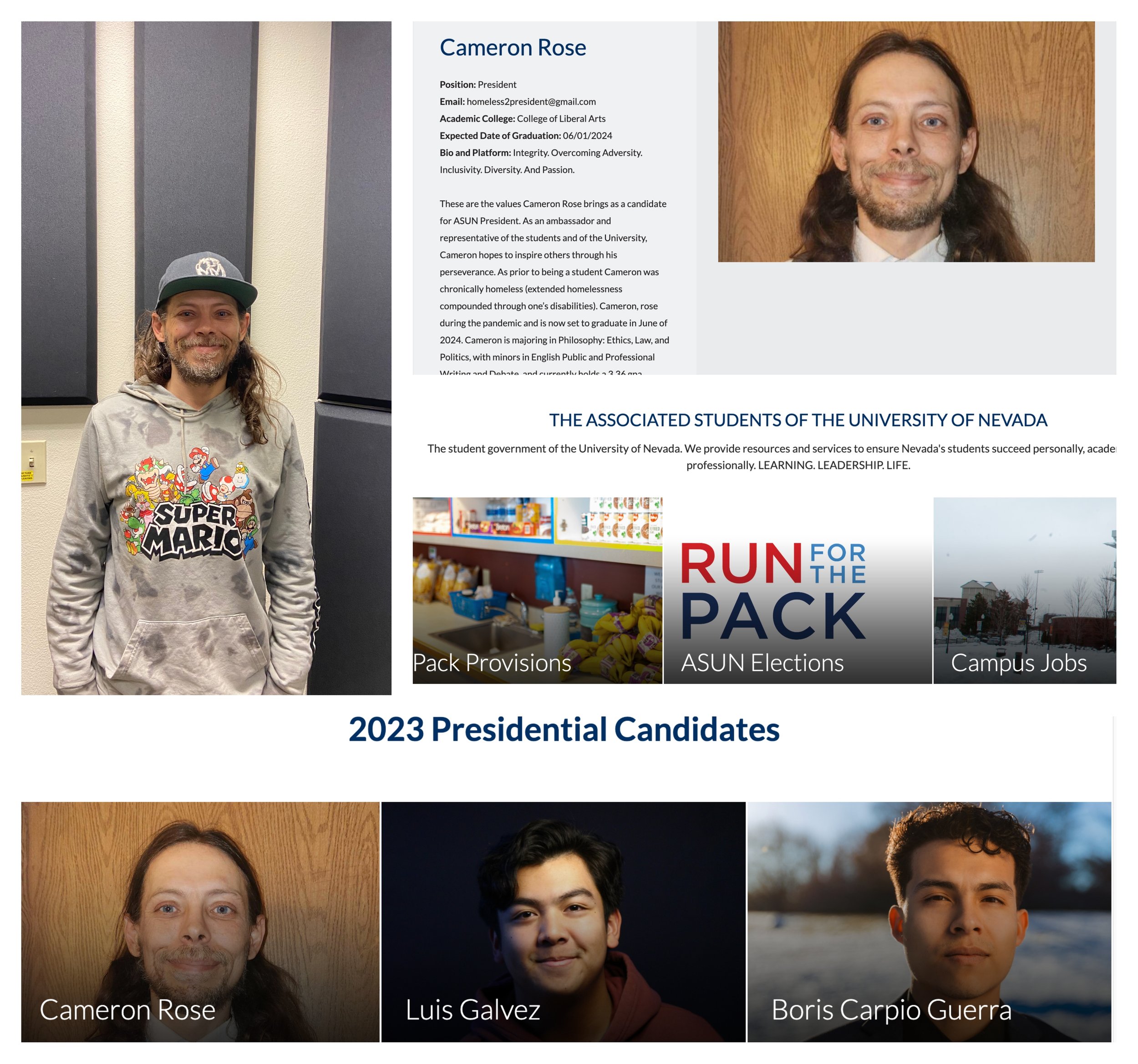“While I was living on the streets, I was educating myself on the law. Reading law cases, going through the laws and the whole constitution, and trying to get an understanding of how to stop going to jail. Because jail was the only place I fit in, especially out here where being homeless is a crime,” Cameron Rose said of his predicament and desire to grow.
Cameron Rose is a Reno native and current student at the University of Nevada, Reno who is currently running to become the new ASUN President (The Associated Students of the University of Nevada). Prior to his enrollment at UNR, Cameron experienced being institutionalized and unhoused and hopes to use his experiences to make changes on campus and encourage perseverance in other students.
His web bio states “Integrity. Overcoming Adversity. Inclusivity. Diversity. And Passion,” as the key words to his platform.
Cameron says he first experienced being institutionalized when he was 12. “It was February 19th, 1997, in a place called the Adolescent Treatment Center over near Galletti Way,” he remembers with precision.
From a young age, Cameron has suffered from various mental health illnesses such as bipolar disorder and insomnia, and has been in and out of treatment. “Life was difficult, actually for me growing up. I grew up institutionalized and on pharmaceutical drugs. Just last year was my 21st anniversary off pharmaceuticals,” Cameron said. “I’m very anti-pharmaceutical, I don’t believe that they’re the solution in any way, and so I’m trying to lead through examples and show that there are other ways through the struggles I went through.”
Bipolar disorder is a mental illness that causes unusual shifts in a person’s moods and energy and activity levels, concentration, and ability to carry out day-to-day tasks. Bipolar patients are prone to agitation which can result in impulsive aggression during manic and mixed episodes.
“My disability and what caused me to become institutionalized is that sometimes I come off as aggressive,” Cameron said. “I’m still currently on disability income because I struggle to find employment. It’s next to impossible to maintain a job when your boss feels like you’re yelling at them. I’m not yelling, I’m trying to explain something. But they feel like you’re arguing with them, and I often get treated as if I’m trying to cause a problem.”
Due to Cameron’s struggles with mental illness, he has been on and off the streets and in jail since he was 18 he says, for about two decades.
In 2019, Cameron says he received an unexpected back payment for his disability income and used it to pay off old student loans from when he attended the University of Phoenix as an online student. He knew he wanted to get back into the education system and as soon as his debts were paid off, he immediately applied to the University of Nevada, Reno.
“It is a huge adjustment from being homeless and doing nothing daily,” Cameron said. “I don’t want to act like homeless people aren’t doing anything, but you obviously have a lot of free time. But that free time would be spent being harassed, in jail, or finding ways to survive.”
Cameron says he comes from a long lineage of Wolf Pack alumni. He says his great-grandfather graduated from UNR as a scientist, while his mother graduated with an accounting degree, achieving magna cum laude honors and finishing at the top of her graduating class. Cameron’s stepdad, Jimmy Carroll, is also an alum who played for the men’s basketball team in the late 1990s. “For me, this is like tradition and heritage. I want to continue that legacy.”
For the last three years, Cameron has been working on a Philosophy B.A. in Ethics, Law, and Politics, with minors in English, Public and Professional Writing, and Debate.
As president, Cameron says his primary focus would be on promoting inclusivity and diversity, as he knows what it feels like to be excluded from the community because of one’s differences. He also plans to put a heavy focus on food waste produced by the University, and improving advising.
.“I’ve heard so many students talk about their graduation dates being stalled because their advisors are not getting them in the right courses,” Cameron said. “I feel this is because the advisors aren’t spending enough time with their students and learning who they are and what their interests are.” College curriculum and required courses often feel restrictive to students and may not line up with their career interests. “Part of my whole push towards autonomy is more options. More choices for students, letting them decide what they want to do.”
After graduating, Cameron has plans to continue his education to attend law school, wanting to specialize in Civil Rights and Disability Law. “I believe that we are not properly representing disability,” he said including for the unhoused who suffer from disabilities.
Cameron is also currently working on a personal memoir titled “They Call Me Crazy” and wants to transcribe his experiences in order to help others expand their understanding on mental illness.
